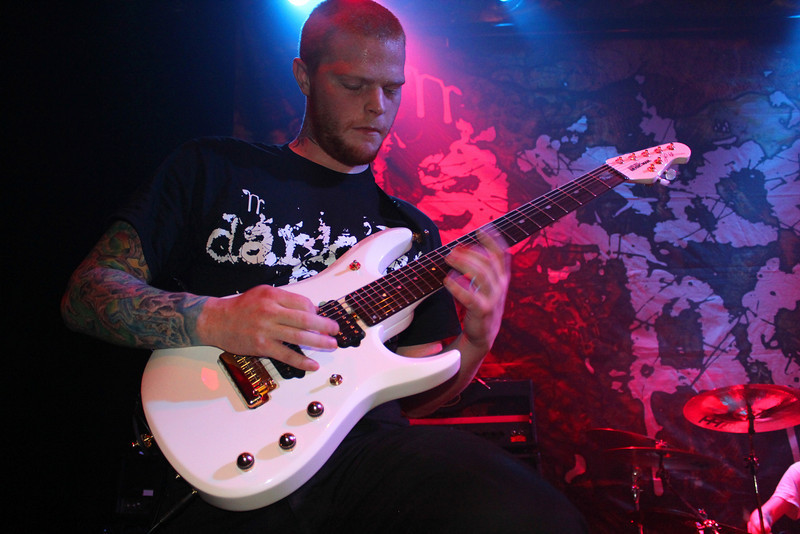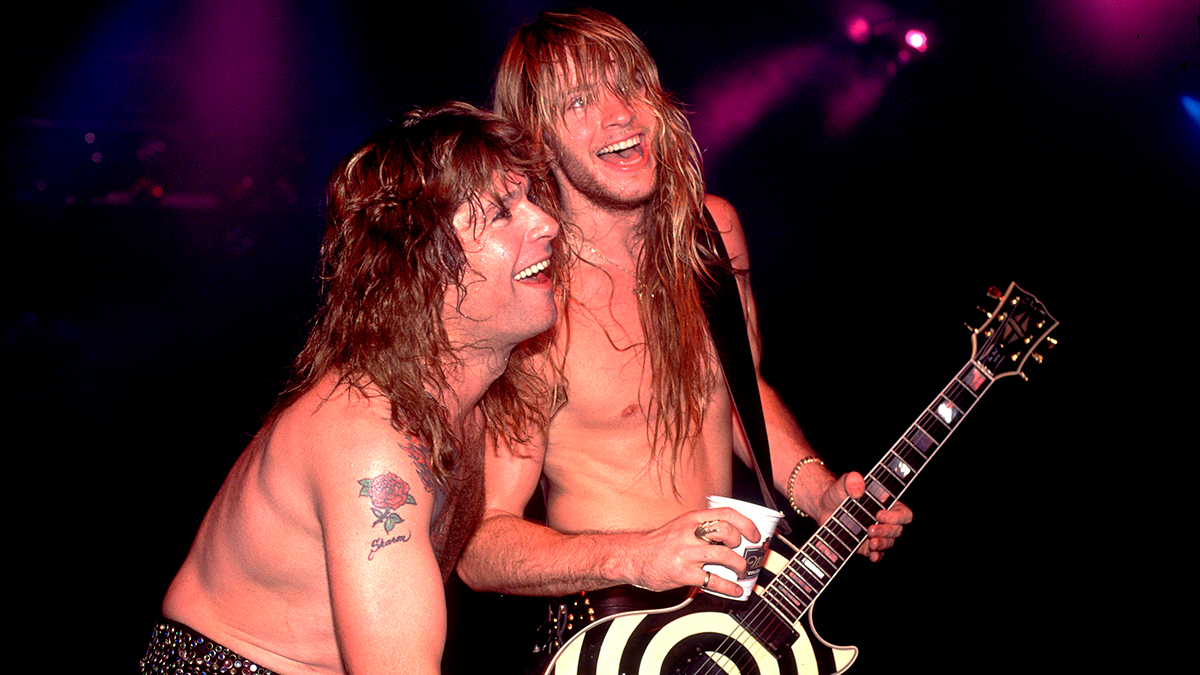Interview: Born of Osiris' Lee McKinney Discusses

The members of Born of Osiris began playing music full time when they were fresh out of high school.
“I actually had to wait until my 18th birthday to sign our contract,” guitarist Lee McKinney says of the band’s deal with Sumerian Records. As a result, none of them have had a chance to experience college, but at least they’re living like college students: McKinney and the rest of Born of Osiris—singer Ronnie Canizaro, keyboardist Joe Buras, bassist David DaRocha and drummer Cameron Losch—share a house in the suburbs west of Chicago.
“We just thought the songwriting process would benefit greatly from the close quarters,” McKinney says of the home, which he and his bandmates show off in a hilarious MTV Cribs–style video viewable on YouTube. “If I’m working on something, I can just open my door and go to Joe’s room and be like, ‘What do you wanna do with this?’ We’re all here to bounce ideas off each other immediately, as opposed to showing up at practice with a WAV file of something one of us has already created.”
The living quarters just got a little bigger, however. Recently, the band parted ways with guitarist Jason Richardson, who subsequently joined the Salt Lake City deathcore band Chelsea Grin.
“Because we tour up to nine or 10 months a year—and because we live together when we’re home—we’re definitely in each others’ faces all the time,” McKinney explains. “So we just need to get along. The five of us in the band now, we grew up together and have basically been in this band since sophomore year of high school. We’re so close now that we can’t even get mad at each other. We just say what we need to say and it’s done. But it wasn’t like that with Jason. On tour we were butting heads, and musically I think we clashed a little bit. This is all about having fun, and when it became a business relationship, we felt like we had to move on.”
They have plenty to move on to. The group is currently touring behind The Discovery, their 2011 album, on which Born of Osiris execute their technical, breakdown-heavy jams with an attention to detail and a sense of atmosphere more refined than many of their peers. They are also set to spend the summer on Warped Tour, and a new album is due out later this year, as well. Guitar World sat down with McKinney to get the update on the band’s status.
GUITAR WORLD: Jason’s departure leaves you as the group’s sole guitarist. Do you have any plans to add a second guitarist anytime soon?
All the latest guitar news, interviews, lessons, reviews, deals and more, direct to your inbox!
We’d really like to find someone, but we’re gonna take our time. If we do get a new guitar player, it needs to be somebody who brings something to the band, somebody who can contribute to the songwriting.
Being the only guitarist in the group gives you a certain degree of authority over the sound. You’d probably forfeit that if you added a new guitarist.
Yeah, but for us it’s not about that. We’re not control freaks.
When did you get serious about playing?
Probably when I had people to play with. My dad got me a guitar when I was 10 and showed me some things by Randy Rhoads and Joe Satriani and guys like that. I was always serious about playing on my own, but at the time you didn’t have the technology to do it easily like you do now, with software instruments. Back then, all I had was a crappy little handheld recorder that I’d record my riffs into. It wasn’t until I found this group of friends that I thought I might have a future as a musician.
Has technology had an impact on your playing?
I think it’s totally enhanced it. I can sit down and record something and put drums and keyboards to it. And if I can’t play it quite fast enough at the moment, I can slow it down and then get it up to speed. Little things like that have definitely pushed me as a player. But it’s good and bad, you know?
What’s bad about it?
A lot of bands—even some of my favorites—go out on the road, and you find out there’s one dude in the band doing everything. Or you discover that they can’t play as well as they sound on the records. A couple of nights ago, we had some friends over and someone put System of a Down on. We were listening and there were all these blatant mistakes on guitar. When I was little I thought that was personality, like there was something cool about these little string bleeps.
And it is cool, but you’re not gonna hear that sort of thing anymore, now that you can quantize beats and make the guitar work sound flawless. And I’m not saying we’re not guilty of that—our records come out polished. But if you can’t pull it off live, that’s when you run into problems.
What do you think are your strengths as a guitarist?
Maybe the more melodic side. Tapping melodies are kind of my favorite thing. I love sweep picking, but a lot of that is just speed-based shred. Guthrie Govan has been my favorite player for years. The feeling that goes into his music blows my mind. It’s not like, “Oh man, that’s so fast!” With him I feel you could play his riffs at any speed—they’re beautiful because of the note relationships, not because of how that diminished run sounds at a high speed.
Who’d you get into after the players your dad introduced you to?
Eric Johnson. Guthrie Govan. For a while, before Jason was in the band, we had Tosin Abasi [of Animals As Leaders] playing guitar for us, and I still look up to him completely. I think his playing is one of a kind. John Petrucci is definitely an influence. At this point in time I don’t really listen to a lot of metal, but when I go onstage, I like the vibe and the energy of a metal show.
What are you hoping to accomplish with the next Born of Osiris album?
We want to bring the personality back to metal. But it’s not going to sound weak because of that. It’ll be just as heavy. And we want to spend time and do it right. Before, it would be like, “All right, mic up the drum set, let’s go. They’re probably gonna resample all this shit anyway.” This time, if we need to spend a few days or a week getting the right drum tone, that’s what we’re gonna do.
How has all the band’s touring honed your style?
For the better. I come home from tour and always feel like I’m way faster. On the first night of a tour, my forearm will be so sore, because we really play with a lot of emotion. We don’t just play the notes—we pick them hard and dig in hard to get the sound we want. But then halfway through, it’s like, “Man, I could do this in my sleep.”
